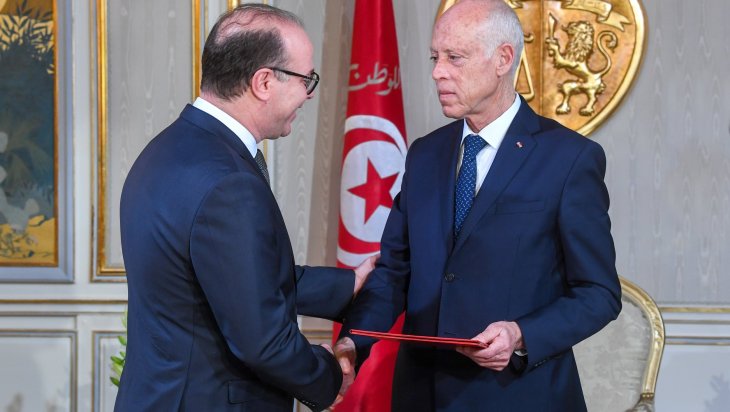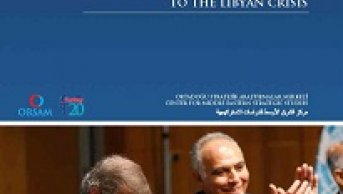Government Formation Efforts in Tunisia

Given a mandate by President Kais Saied to form the government, Tunisian Prime Minister-designate Elyes Fakhfakh has faced a dilemma due to the threat of the Ennahda Movement Party not to grant its confidence vote to Fakhfakh’s government. Fakhfakh needs to get the vote of confidence for the cabinet he will present to the assembly, on the one hand, and tries to act within the political boundaries determined by President Saied for him, on the other. Last week, the head of Ennahda Movement's Shura Council, Abdelkarim Harouni, declared that he rejected the idea of a government that excludes other parties and that the country should be prepared for a new election if necessary. This statement has brought up the possibility that the government formation talks, which have continued since October, have come to a deadlock. Indeed, Fakhfakh’s political estimate to leave the two major right parties in the opposition and to establish the cabinet with the rest of the assembly has been blocked by the new political stance that the Ennahda Movement has adopted through the discourses of “national interest” and “political inclusion”. After the Ennahda Movement announced its readiness for new elections, Fakhfakh met Nabil Karoui, the leader of the Qalb Tounes Party on February 6 and enabled him to participate in the consultations on the government formation process in the following day. While it has not been clear yet how the process will evolve in the upcoming days, it can now be deduced that the Ennahda Movement aims to expand its political sphere in this process and will pursue an active policy as a balancing act against the new ground which President Saied has gained in Tunisian politics.
New Political Balance After the Elections
During the session dedicated to the vote of confidence in the Tunisian assembly on January 10, Habib Jemli, who had been assigned by the Ennahda Movement to form a government, failed to get the necessary backing. With the authority given to him by the constitution, President Saied, on the other hand, started his efforts in regard to the government formation process and chose Fakhfakh among the candidates he received from the parties to form a government. Immediately after his appointment, Fakhfakh explained that he would not include the Qalb Tounes and Free Destourian Parties in the coalition talks. Moreover, Fakhfakh explained that he would form the cabinet from “pro-revolutionary” formations in the parliament, while he does not consider these parties (Qalb Tounes and Free Destourian Party) on the path of the revolution and hence meeting the people’s expectations regarding the road ahead.
Considering the fact that the Democratic Forum for Labour and Liberties (also referred to as Ettakatol), of which he is a member, received 0.34% of the votes in the presidential election and, thus, has no seats in the assembly, it will be seen that Fakhfakh is not a candidate with a popular legitimacy in the prime ministerial post. Therefore, Fakhfakh’s only source of legitimacy is President Saied. In addition, he owes much to the Tahya Tounes Party led by Youssef Chahed and to Attayar (the Democratic Current) Party, which nominated him. As a result, if it had not been for them, he would remain a much less effective politician with a 0.34% popularity rate. Thus, it is quite conceivable to think that the main reason behind Fakhakh’s announcement that the Qalb Tounes and Free Destourian Parties would not be included in the national unity government is primarily due to President Saied and that this very idea is supported by the Tahya Tounes and Attayar parties. Indeed, what Fakhfakh said about President Saied immediately after he took office confirms this statement. “All parties voted for Kais Saied, because he embodies values and principles of the people, except those two parties” Fakhfakh said. With these words, he touched on the president’s success that goes beyond the parties and reiterated the discourse that the president has more legitimacy than any party in the assembly. Nevertheless, his plan to divide the assembly into revolutionary and non-revolutionary parties and build the cabinet on this distinction had to change with the political stance of the Ennahda Movement.
Latest Situation in Government Formation Negotiations
Fakhfakh announced on Monday, January 27, that joint commission meetings between the parties, would begin on Tuesday morning at Dhiafa Palace in Carthage. To this end, a meeting was held on Tuesday with various representatives of the parties that would form the government coalition, including the Ennahda, Achaab (the People’s Movement), Attayar and Tahya Tounes Parties. In the second session, he met with representatives of the Machrouu Tounes Party, Popular Republican Union (UPR) Party, Nidaa Tounes Party, al-Badil Party, and Afek Tounes parties.
In this process, Fakhfakh announced a government contract text titled “transparent government and restoration of trust” and it became clear that the government plan would be built within this framework. The given plan includes the “reorganization of ministries” with a small cabinet of 25 ministers and full or partial removal of state secretariats as well. Shaped around main axes related to “principles, approach, executive mechanisms, priorities of government action, this program envisages “a comprehensive reform such as the architecture of the government composition as well as the economic and social dimension”. According to Fakhfakh’s sharing on his official account, the reforms in this text aim to regain the trust of the citizens, the state and the political class.
In the wake of the meeting, Rached Ghannouchi made a statement that they would support the current plan, but the coalition should be open to all parties. Later, the statements in this direction were repeated by many other names and it was stated that the party was ready for early elections if necessary. Calling for impartiality by saying “like Saied, the head of all Tunisians, Fakhfakh must be the head of the government that embraces all Tunisians,” Ghannouchi asserted that they would not give a vote of confidence in the absence of political inclusion.
First of all, as the area of political maneuvering of the Ennahda Movement has expanded with this development, Fakhfakh’s already weak image has suffered a great injury. Not being very popular among the people due to his economic policies during the troika governments before 2014, he was deemed appropriate for this position because he was unlikely to turn into a strong opponent in the future. However, the risk for his image to be badly injured brings with it the possibility of a new failure in the government formation process.
Towards a New Political Fault Line?
The new political distribution that emerged after the 2019 elections in Tunisia demonstrates that the balances in Tunisian politics are transforming radically. Perhaps the most obvious result of the elections is that a revisionist president has come to power with strong support, while the assembly has remained fragmented. However, Saied’s desire for a comprehensive administrative and political reform for the future of the country makes the situation even more complicated. Besides, the failure to form the government since the elections renders the situation even more insoluble for every political actor in the assembly under these circumstances. The parties trying to take part in a possible government at the same time try to push their rivals out of the political sphere.
The cleavages within the assembly and inter-party competition have turned the negotiations to form a government into a major disadvantage for the Ennahda Movement. As a consequence, the cabinet formed by Habib Jemli did not get the vote of confidence, but in this process, the Ennahda Movement gained extensive information on the political agenda of other parties. The fact that the Achaab, Karama, and Attayar parties demanded the same ministries during the coalition talks conducted by Jemli will be regarded as a useful trump for the Ennahda Movement in the new talks. In addition to this situation, excluding the Qalb Tounes and Free Destourian Parties from the coalition, Fakhfakh has lost the possible support of more than 25% of the assembly. This seems to have provided Ennahda with a crucial political room for maneuver.
In addition, the left-wing parties, which have gained importance in the new political equation in the Tunisian assembly that emerged after the elections, apparently will try to eliminate the Qalb Tounes and Free Destourian Parties from the political sphere. Several right-wing parties, no matter whether they are big or small, also back this policy. Especially for the Tahya Tounes Party, led by Youssef Chahed, this policy is a strategic move that may result in the marginalization of two of its competitors, recruiting moderate and pragmatist names and hence the expansion of its grassroots.
It still remains unclear if Fakhfakh will get an assembly majority for his government by February 21; meanwhile, it is highly unlikely for him to meet Nabil Karoui and to include his party in government formation negotiations without consulting with President Saied. That is why these latest developments regarding government formation efforts point to a new axis that started to emerge between President Saied and the Ennahda Movement. President Saied is expanding his own political influence through the uncertainty and assembly division that emerged after the elections and tarnishing especially the image of the political parties. On the other hand, the Ennahda Movement is one of the parties most severely affected by this situation. According to the latest polls, the downward trend in Ennahda's voting rates continues to increase. For this reason, it seems quite likely that the Ennahda Movement, which has been pursuing a consensus policy until today, will tend to follow a stricter policy in response to the president’s steps.










